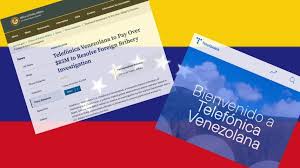Telefónica’s Bribery Scheme — The Usual Suspects and Tools (Part II of III)

We should all admit something (among many things) — reading through factual statements of bribery offenses, the facts all start to meld together. Criminals are not as ingenuous or creative as they think, and the schemes they employ are fairly straightforward.
Let’s start with one profound grasp of the obvious — To pay bribes, criminals have to “steal” money from the company, that is, they have to gain unauthorized access to company funds and circumvent financial controls. There are not as many ways to accomplish this and the bribery schemes reflect this simple truism.
Telefónica’s scheme is nothing surprising — Telefónica had to bribe two Venezuelan foreign officials to secure access to Venezuela’s currency auction at which they could exchange Bolivars for US Dollars. The value of the exchange was that the price for US Dollars was well below the prevailing price for currency conversion on the black market, which was significant and vibrant. By securing valuable US dollars, in effect, Telefónica was able to then buy telecom equipment for a cheaper price than otherwise available.
Over a two year period, 2014 and 2015, Telefónica used a bribery scheme financed by two equipment suppliers, Company-A and Company-B, to ultimately purchase telecom equipment using US Dollars rather than bolivars, for its Venezuelan telecom system. Company-A and Company-B would only sell the telecom equipment for US dollars, sop they assisted in the bribery scheme to facilitate the equipment sales to Telefónica.

The bribery payments were pretty steep, totaling approximately $28,870,099 in corrupt payments. Company A and Company B, in turn, funneled the dollars to the foreign officials through an intermediary company and a shell company. Telefónica financed the bribes by agreeing to purchase equipment from Company-A and Company-B at inflated prices.
Telefónica knew that a significant portion of the approximately $28,870,099 would be paid as a “commission” for the benefit of the Venezuelan government officials. As a result of its corrupt payments, Telefónica was permitted to exchange and subsequently received over $110 million through the currency auction, which it used to purchase equipment from Company-A and Company-B.
In total, in August 2014, the Venezuelan government awarded approximately $172,046,000 to 16 telecommunications companies as part of the currency auction. Between the two bids it corruptly orchestrated, Telefónica received approximately 65% of the total currency awarded in the auction. Telefónica was able to deploy those funds (less the $28,870,099 paid to Intermediary-1 through Shell Company-1) to buy network equipment from Company-A and Company-B and thereby continue providing telecommunications services to customers in Venezuela.
In May 2014, shortly before the currency auction was publicly announced, Telefónica Executive-1 was summoned to an impromptu meeting with Foreign Official-1 and Foreign Official-2 and Executive-1, that: (i) the Venezuelan government would soon be announcing a currency auction for the telecommunications industry; and (ii) Telefónica Venezolana would only be awarded U.S dollars through the auction if it paid a “commission” on any funds awarded, meaning bribes that would personally benefit Foreign Official-1 and Foreign Official-2.
In July 2014, using their personal, U.S.-based email accounts, Company-A individuals exchanged drafts of a “consultancy agreement” between Company-A’s parent company and an as-yet-unnamed counterparty, to be identified by Intermediary-1 once Telefónica Venezolana and Company-A’s “bid” in the currency auction was successful. In August 2014, Intermediary-1 informed Company-A Employee that the counterparty for the consultancy agreement would be Shell Company-1. At no time did Shell Company-1 or Intermediary-1 in fact perform any consultancy services for Telefónica Venezolana.

On August 4, 2014, Intermediary-1 contacted Company-A Employee to relay that Company-A had been awarded “everything”—all the U.S. dollars—that it had applied for through the auction. Also on August 4, 2014, the Venezuelan government announced that Company-A had been awarded approximately $55,454,000 through the auction. Two days later, on August 6, 2014, the Central Bank of Venezuela debited approximately 609,994,000 bolívars from Company-A’s bank account, as the funds that would be exchanged for the U.S. dollars awarded.
Beginning on November 26, 2014, through December 2, 2014, an affiliate of Company-A transferred a total of approximately $13,863,473, representing 25% of the $55,454,000 awarded to Company-A through the auction, to Shell Company-1’s bank account in Luxembourg. Several of the transactions comprising the $13,863,473 to Shell Company-1 transited through correspondent banks located in the Southern District of New York.
Company-A used most of the $55,454,000 obtained from the auction as payment from Telefónica Venezolana for network equipment. Telefónica Venezolana reimbursed Company-A for the corrupt payments of $13,863,473 to Shell Company-1 by inflating the per-unit cost of the equipment that Telefónica Venezolana purchased from Company-A.
In May or June 2014, Executive-1 coordinated with representatives of Company-B to use Intermediary-1 to facilitate Company-B’s participation in the upcoming auction. Between May 2014 and July 2014, Telefónica Venezolana and Company-B agreed that Telefónica Venezolana would directly participate in the auction and that the auction proceeds awarded to Telefónica Venezolana would be used to purchase network equipment from Company-B.
In June and July 2014, Company-B Employee exchanged emails with Intermediary-1 and Intermediary-2 concerning Telefónica Venezolana purchasing equipment from Company-B with the auction proceeds. Attachments to these emails indicate that Company-B’s prices were inflated such that Telefónica Venezolana would bear the cost of the bribes.

On August 4, 2014, the Venezuelan government announced that Telefónica Venezolana had been awarded approximately $60,027,000 through the auction. In August 2014, the Central Bank of Venezuela debited approximately 660,291,563 bolívars from Telefónica Venezolana’s bank account, as the funds that would be exchanged for the U.S. dollars awarded.
On August 18, 2014, Telefónica Venezolana entered a contract with Company-C, acting on behalf of Company-B as its purported network integrator—for the purchase of network equipment. In fact, Company-C never performed any services for Company-B.
On September 3, 2014, the Central Bank of Venezuela transferred approximately $60,026,505.73 to Company-C through a correspondent bank located in the Southern District of New York.
On September 24, 2014, Company-C and Shell Company-1 entered into a purported “Commission Agreement” according to which Shell Company-1 would act as a “consultant” for the “Procurement of Communications Equipment for TELEFONIC VENEZOLANA, C.A.” On September 30, 2014, Shell Company-1 issued an invoice to Company- C for “fees” for $15,006,750.
On October 28, 2014, Company-C transferred approximately $15,006,626, representing 25% of the funds awarded to Telefónica Venezolana in the auction, to Shell Company-1’s bank account in Luxembourg. This transaction went through a correspondent bank located in the Southern District of New York.
Company-B and Company-C used the $60,027,000 in auction proceeds as payment from Telefónica Venezolana for network equipment. Telefónica Venezolana bore the cost of the $15,006,626 payment to Shell Company-1 by inflating the costs of the network equipment that Telefónica Venezolana purchased from Company-B through Company-C.
Intermediary-1, and Intermediary-2, and others, paid for the lavish expenses of Foreign Official-1 and Foreign Official-1’s family. For example, beginning in December 2014 and continuing through January 2015, Intermediary-1 spent more than $500,000 on a lavish vacation in Saint Barthélemy for Intermediary-1, Foreign Official-1, and members of their respective families.
Additionally, in January 2015, using some of the corrupt proceeds received through Shell Company-1, Intermediary-1 spent approximately $605,000 on luxury watches and jewelry in Saint Barthélemy, including for the benefit of Foreign Official-1 and Foreign Official-1’s spouse.















